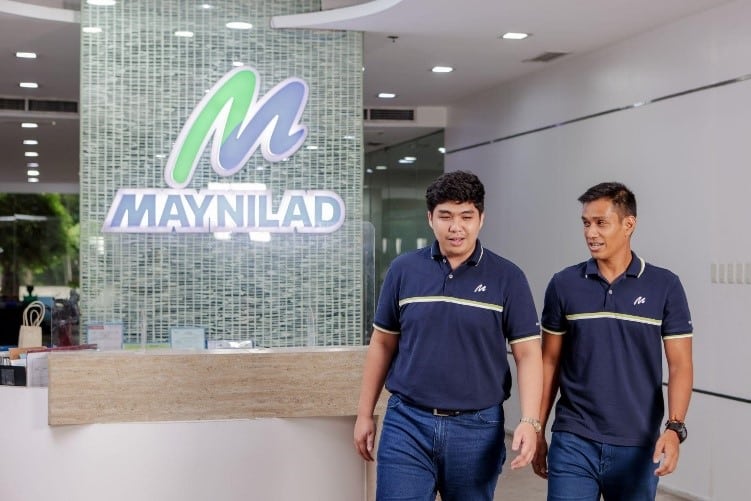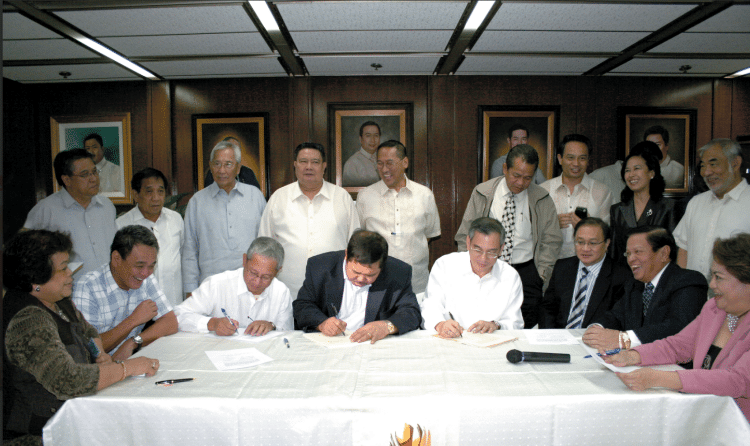Water and wastewater utilities are essential services which power people’s everyday lives–even if many rarely notice their presence, expecting their availability to be a given. They provide nourishment, enable proper hygiene, and impact the cleanliness and comfort of one’s surroundings. They also support economic activities–offices and malls to plants and factories will not run without these.

Maynilad is presently the utility with the largest water concession in terms of active connections not only in the Philippines but the whole of Southeast Asia.
For more than 10 million Filipinos, the company which delivers these essential services is Maynilad. Specifically, Maynilad serves water consumers from the Metropolitan Waterworks and Sewerage System’s West Zone concession. It is an area which encompasses 540 square kilometers, and consists of 17 cities and municipalities: Caloocan, Malabon, Navotas, Valenzuela, parts of Quezon City, parts of Manila, parts of Makati, Pasay, Parañaque, Las Piñas, Muntinlupa, and portions of Cavite.
With this, Maynilad is presently the largest water concessionaire not only in the Philippines but the whole of Southeast Asia in terms of active connections, which currently number at more than 1.5 million.
While Maynilad now proudly stands as both a local and regional leader in the water and wastewater sector, its journey is one defined by perseverance, innovation and an unfailing commitment to its mission.
Road to privatization
Maynilad’s history dates back to the 1990s during a water crisis in the Philippines when approximately 60% of the population lacked access to potable water and faced unreliable supply. This crisis paved the way for the National Water Crisis Act of 1995, which facilitated the privatization of the MWSS.
Maynilad was initially formed in 1997 by a consortium of local and foreign private companies with the aim of stabilizing water services in the West Zone concession. However, operational and financial challenges, including the Asian Financial crisis in 1997, resulted in its operations reverting back to the MWSS in 2005.

Maynilad was reprivatized in 2007 when MPIC and DMCI took over its operations. Marubeni Corporation also took a stake in the company in 2013.
In 2007, Maynilad was re-privatized upon the takeover of Metro Pacific Investments Corporation (MPIC) and DMCI Holdings, Inc. (DMCI), two local conglomerates with extensive experience and portfolios in the utilities and infrastructure sector. In 2013, they were joined by Marubeni Corporation, a Japanese conglomerate which includes a strong water business across the Asia-Pacific region.
Start of a new era
The re-privatization of Maynilad under new ownership marked a turning point. The new management resolved to address many of the concession’s challenges, particularly through aggressive years-long capital expenditure (capex) programs that continue to this day. Since 2007, the company has spent more than PHP 250 billion to build and improve infrastructure, enhance service delivery, and restore financial stability.
As a result of its significant capex program, Maynilad has been able to develop the infrastructure needed to service its customers. Currently, it operates and maintains 8 water treatment plants; 23 wastewater facilities, including 20 sewage treatment plants, 2 joint sewage & septage treatment facilities, and 1 septage treatment facility; 129 waste pumping stations/lift stations; 13 deep-well pumping stations; 39 reservoirs; 39 mini boosters and pumping stations; and 7,815 kilometers of active water pipelines.
Serving a large customer base in densely populated areas with an underdeveloped infrastructure, Maynilad has also consistently shown a penchant for innovation and strategic planning. The company has been able to adapt to limited raw water allocations from the Angat Dam and has efficiently managed an aging pipeline network. It has also addressed the challenges of operating in coastal regions vulnerable to flooding and saltwater intrusion, showing resilience in delivering reliable water services.
As part of its investment to update and streamline its operations, Maynilad has set up a Central Control and Monitoring Room which enables the company to better keep track and analyze situations across its concession area and provide more timely and targeted responses.
Engineering a turnaround
With its investments and interventions, Maynilad was able to turnaround its operations and improve the services that its customers receive. From 2006, when water coverage only reached 80.5% of the population in the West Zone concession, it has now extended to 94.7% as of the second quarter of 2024. Considering that the West Zone concession’s population increased by three million during this period further underlines the dexterity of this feat.
During the same period, Maynilad has been able to increase the availability of 7 pounds per square inch (psi) water pressure–what it takes for water to reach the second floor of a building without a booster–from 45% to 95%. Currently, 95.3% of its customers enjoy this feature 24 hours a day.
These operational improvements, coupled with prudent debt management and steady capital build up, has helped the company deliver positive financial results. From 2007 to 2023, the company was able to stem losses and deliver a cumulative annual growth rate (CAGR) in Revenues of 8.5%.
Towards sustainable growth and service excellence
Despite its achievements, Maynilad knows that there is much to be accomplished, and remains driven in delivering on its commitment to provide safe, affordable, and sustainable water solutions that enable the communities it serves to lead healthier and more comfortable lives. This purpose is anchored in the United Nations Sustainable Development Goal (SDG) 6: Clean Water and Sanitation, ensuring that Filipinos have access to clean water for a better quality of life.
Looking to the future, Maynilad is focused on several key initiatives to further improve service delivery. One of the major goals is to enhance wastewater coverage by expanding its sewerage systems, and reducing non-revenue water (NRW) through strategic infrastructure improvements. These efforts are aligned with the company’s commitment to achieving long-term operational efficiency and meeting the growing needs of the communities it serves.
Maynilad’s aggressive capex programs has resulted in a slew of new and updated infrastructure and facilities, such as its Parañaque NEW WATER Treatment Plant, that enables it to meet the growing needs of its customers.
Integrating environmental, social, and governance (ESG) factors into every aspect of operations is a central part of Maynilad’s strategy. The company has set clear targets to guide its initiatives in climate neutrality, expanding water recycling efforts, and improving water recovery processes. These steps are integral in minimizing Maynilad’s environmental impact and ensuring water resilience amid climate challenges.
Moreover, driven by increasing water demand due to a still expanding population and increasing economic activity in the West Zone concession, Maynilad is constantly looking for new raw water sources–the backbone of its business. Among its identified future water sources is the New Centennial Water Source-Kaliwa Dam Project, which is expected to be completed by 2028. The project will provide 300 million liters per day (MLD) of raw water, strengthening Maynilad’s capacity to meet future demand and deliver reliable water to its customers. For this, the company is investing in a new water treatment plan and a 48-kilometer pipeline that will run across Laguna Lake to help ensure sustainable water availability for its customers for years to come.
Through ongoing investments, strategic initiatives, and innovative solutions, Maynilad ensures reliable service delivery while prioritizing environmental and social responsibilities. Committed to sustainable growth, the company continues to enhance the well-being of the communities it serves and strengthens its role as a key partner in ensuring water security for the West Zone concession.
ADVT.
This article is brought to you by Maynilad.
Read more stories here:
Mister Potato Philippines partners with Netflix’s Squid Game 2 for “Crunch to Win” contest
A festive feast awaits: RACKS and Tenya unveil new holiday offerings

